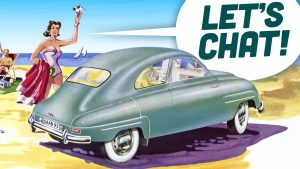Good morning! Today we’re taking a look at a couple of cool little rear-wheel-drive coupes from the Pacific Northwest, both with the same aftermarket carburetor: the common Weber DGV. Which one wears it better? That’s what we aim to find out.
Yesterday, we looked at two Swedish station wagons, and in what might be a first, the Saab has lost the vote. Was it the Opel V6? The automatic? Or the fear over finding parts to fit a completely defunct brand? Whatever it was, I guess a Saab had to lose eventually, and it’s only fitting that it lose to a Volvo.
I’m torn on this one, myself. I love the looks of the Saab, and I have some experience with a GM-era 900, which was a really nice car to drive. But then again, I have some experience with a GM-era 900, which was a colossal pain in the ass to live with. So I guess I’ll go Volvo, just because I’ve never had one before, and get to experience a whole new set of old-car problems.

If you’ve spent any time at all around four-cylinder engines from the 1970s, chances are you’ve come across one with a Weber 32/36 DGV carburetor fitted. This downdraft progressive two-barrel carb has been fitted to just about every smallish to medium-sized engine you can think of. They’re popular choices for cars originally choked with smog equipment, like the late MG and Triumph models, and they’re an easy way to work around issues with feedback carbs on vehicles like Toyota and Datsun pickups. With the right intake manifold, jets, and tuning, you can adapt them to just about anything. They’re easy to spot by their rectangular air filter.
Both of today’s cars have been modified with Weber carbs, and in both cases, I bet it was a serious improvement over the stock setup – even if one of them doesn’t exactly run at the moment. Let’s take a look.
1976 Ford (Mercury) Capri – $3,000

Engine/drivetrain: 2.3-liter overhead cam inline 4, four-speed manual, RWD
Location: Aloha, OR
Odometer reading: 20,000 miles (probably rolled over)
Operational status: Runs and drives well
In the 1970s, Ford offered a sporty two-door coupe that was smaller than its previous offerings, and didn’t have a V8 available, but it handled pretty well and had a unique style all its own. It also, for some reason, offered the Mustang II. Seriously, lots of people over the years have asked why Ford didn’t just develop the Capri into the second-generation Mustang, instead of importing it as-is and selling it strictly through Lincoln-Mercury dealers.

Fitting the V8 may have been a challenge; the Capri’s engine bay was only designed for four cylinders and the narrow Cologne V6. This one has the 2.3-liter overhead-cam four seen in millions of Pintos, Mustangs, and Rangers. In addition to the aforementioned Weber carb, I also see an aftermarket radiator and a smattering of other new parts. The seller says it runs and drives very well, and is fun to drive. I don’t doubt it.

Inside, it’s got newer seats and an aftermarket steering wheel, both welcome upgrades, and the rest of the interior looks pretty good. I feel like I should recognize those seats, but I can’t place them. If someone else knows where they’re from, please enlighten me.

Outside is where it could use some work. It’s in primer, and the seller has done a bunch of body work already, but it still has a little bit of rust to clean up, and then it will need paint. Though I suppose for this price, you could just grab a Harbor Freight paint gun and go for it. Capris aren’t rare enough to warrant a full-on rotisserie repaint, but it would be nice to see it shiny.
1979 Toyota Celica GT Liftback – $2,500

Engine/drivetrain: 2.2-liter overhead cam inline 4, five-speed manual, RWD
Location: Kenmore, WA
Odometer reading: 15,000 miles (also probably rolled over)
Operational status: Cranks but won’t start, previous owner screwed something up
Speaking of Ford’s pony car, it was the inspiration for the Toyota Celica as well, originally based on the Corona platform, but with swoopy coupe bodywork. In its second generation, the Celica got less swoopy, but more practical, and gained a reputation as an excellent sporty alternative to boring economy cars, especially the Liftback body style like this.

Later Celicas distinguished the ST model from the GT by a difference in horsepower, but in 1979 they all had the same 20R four-cylinder, the engine that made Toyota’s trucks famous. This one has a Weber carb and an exhaust header, installed by the original owner, to help it breathe a little better. Unfortunately, the owner in between that person and the current seller seems to have been a bit inept, and somehow did something to the ignition wiring that’s preventing it from starting. It ran and drove well when they bought it, but the current seller bought it non-running, and it doesn’t sound like they really know what they’re doing either. I’m sure either Stephen Gossin or I, or someone else with some troubleshooting experience, could have it humming in an afternoon.

It’s in good shape generally, which leads me to believe its five-digit odometer has only rolled over once, for a total of 115,000 miles. I’m sure the dash top is cracked under that cover, and there is a bad spot in the vinyl on the driver’s seat from where the seatbelt rubs, but apart from that it looks good inside. Or rather, it would, if someone attacked it with a shop vac and some Armor-All. Presentation, people. It matters.

Outside, it’s faded, but rust-free, and features the requisite aftermarket rear window louvers. Apart from those and some cheap fog lights, it looks completely stock outside, which I haven’t seen in years. I can’t tell if the hood is ajar in this photo, or if it has a slight bend in it; hopefully it’s just the former.
By now it’s pretty well-known that I love little sports coupes like this. I’d happily take on either one of these as a project, and have a blast nursing them back to health. But as always, it’s not up to me. The decision is yours.
(Image credits: sellers)









That Capri looks like a mess,and would probably require a lot of rust repair,although I think it’s a nice base.
I find the Celica a bit more complete and it should be simple enough to wire a new ignition system,also I love those old Toyota steering wheels.
I’m going Celica for nostalgia. When I was a kid, my favorite uncle had one, although in dark blue. He took me and my siblings all kinds of places in it over the years. I’d just restore it to stock and be done with it. A slow stick shift is classic fun anyway.
I’m going Fiat 500 for nostalgia. And the best thing is Abarth.
Voted Capri out of sentimentality, since this was my first car. It was a hand-me-down from an uncle and I had a blast at age 18 collecting it in LA and driving it back to Northern California. This Capri might look a little rough, but it runs and drives.
I want the Capri more but I don’t know much about bodywork, mechanical/electric I can do.
No question on this. My first “real” car, was a ’72 Capri with the 2 liter four in it. I loved that car, and drove it right into the ground. My college pals nicknamed it The Grungemobile (and this was well before the word “grunge” had positive musical connotations). Can’t say I like the styling of the ’76 as much but it’s close enough. Nostalgia uber alles, baby!